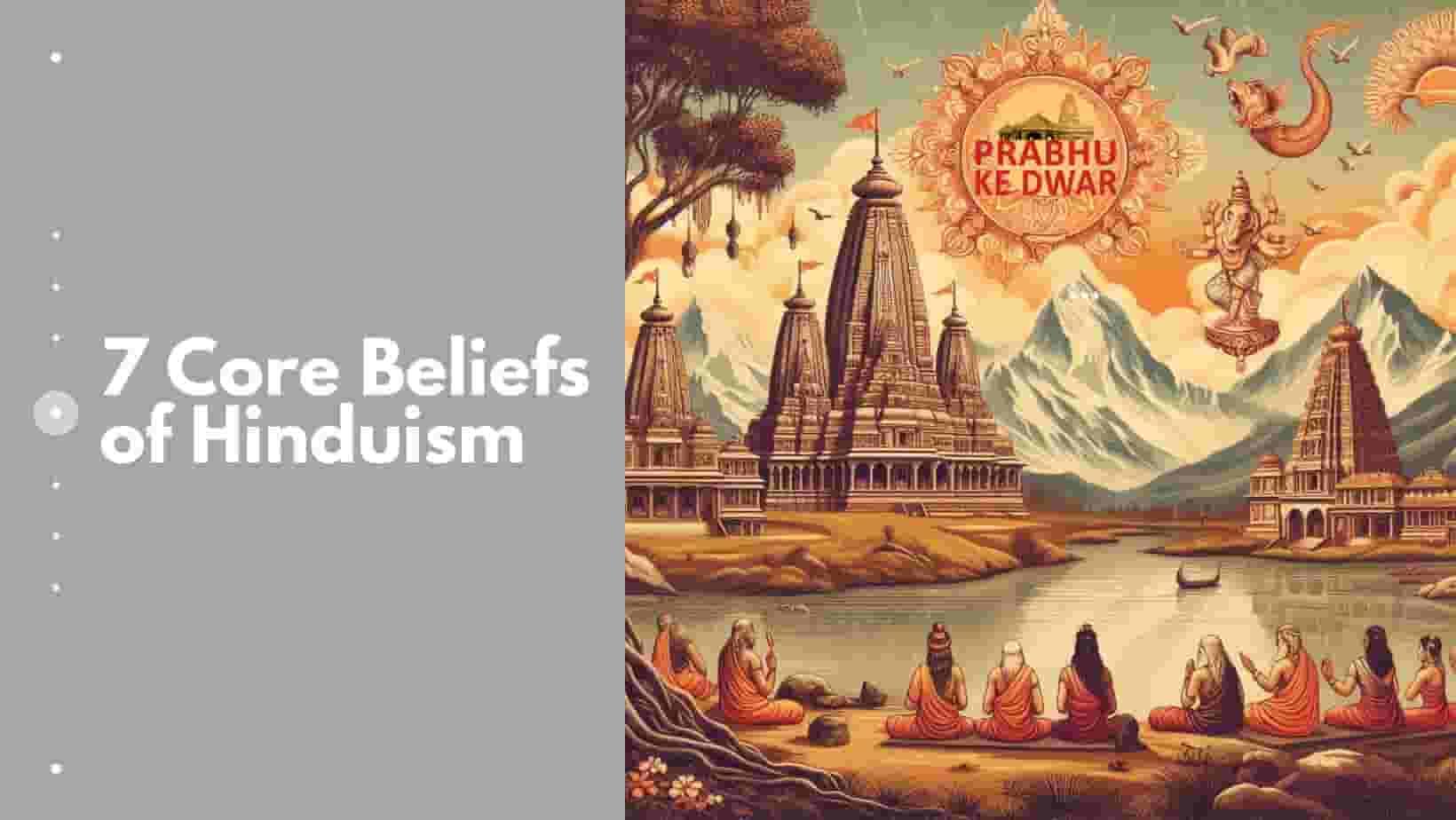7 Core Beliefs of Hinduism: Simplified Insights

Hinduism, one of the world's oldest and most profound spiritual traditions, encompasses a rich tapestry of beliefs and practices that guide millions of adherents. This article explores the seven core beliefs of Hinduism, offering a deep dive into their spiritual and philosophical significance.
1. Belief in Dharma (Righteousness)
Dharma represents the universal law and moral order that sustains society, nature, and the universe. Hindus believe that adhering to one's dharma ensures harmony and balance in life.
-
Key Points:
-
Dharma varies based on age, caste, gender, and individual circumstances.
-
It guides ethical behavior and duties.
-
Example: A teacher’s dharma is to impart knowledge, while a student's dharma is to learn diligently.
For more insights on dharma, see Dharma Explained by Britannica.
2. Belief in Karma (Cause and Effect)
Karma emphasizes the principle of cause and effect, asserting that every action has consequences.
-
Key Points:
-
Good deeds lead to positive outcomes, while negative actions result in challenges.
-
Karma shapes one’s present and future experiences.
-
This belief encourages individuals to act with mindfulness and compassion.
Example: Helping others selflessly may lead to unforeseen blessings.
For more on karma, visit Resource on Karma.
3. Belief in Samsara (Reincarnation)
Hindus believe in the cycle of birth, death, and rebirth, known as samsara. This process continues until one attains liberation (moksha).
-
Key Points:
-
Samsara is driven by karma.
-
Liberation is achieved through self-realization and detachment.
-
Example: A virtuous life paves the way for a higher rebirth.
Learn more about samsara at Reputable Samsara Insights.
4. Belief in Moksha (Liberation)
Moksha is the ultimate goal of Hinduism—freedom from the cycle of samsara and union with the divine.
-
Key Points:
-
Moksha is achieved through knowledge (jnana), devotion (bhakti), and disciplined action (karma).
-
It represents eternal bliss and self-realization.
-
Example: Meditative practices can lead to a deeper understanding of the self and the universe.
5. Belief in Brahman (Universal Soul)
Brahman is the ultimate reality and cosmic principle in Hinduism. It is formless, infinite, and eternal.
-
Key Points:
-
All beings and things are manifestations of Brahman.
-
Realizing one’s unity with Brahman is central to spiritual awakening.
-
Example: The phrase “Aham Brahmasmi” (“I am Brahman”) encapsulates this belief.
Explore more on Brahman at Trusted Resource on Brahman.
6. Belief in Atman (Individual Soul)
Atman is the individual soul or essence, considered eternal and indestructible.
-
Key Points:
-
Atman is a reflection of Brahman.
-
Self-awareness and understanding lead to spiritual liberation.
-
Example: Practices like yoga and meditation help in realizing the Atman within.
7. Belief in Religious Pluralism
Hinduism embraces diversity in spiritual paths, recognizing that all paths lead to the same truth.
-
Key Points:
-
The concept of “Ekam Sat Vipra Bahudha Vadanti” (“Truth is one, the wise call it by many names”).
-
Respect for various beliefs fosters harmony.
-
Example: Hindu temples coexist with mosques and churches in many regions, symbolizing religious inclusivity.
Featured FAQs
What are the seven core beliefs of Hinduism?
The seven core beliefs of Hinduism include dharma, karma, samsara, moksha, Brahman, Atman, and religious pluralism. These principles guide ethical behavior, spiritual growth, and understanding of the universe.
What is the importance of dharma in Hinduism?
Dharma is essential in Hinduism as it ensures harmony in life by guiding moral and ethical conduct. It varies based on an individual's role and responsibilities.
How does karma influence life in Hinduism?
Karma shapes life experiences by linking actions with consequences. Good actions lead to positive outcomes, while negative actions result in challenges.
What is the ultimate goal of Hinduism?
The ultimate goal of Hinduism is moksha, or liberation from the cycle of samsara, leading to eternal bliss and union with the divine.
What is Brahman in Hinduism?
Brahman is the ultimate reality and cosmic principle in Hinduism, representing the infinite, formless, and eternal source of all existence.
Summary
Hinduism’s seven core beliefs offer profound insights into life, spirituality, and the cosmos. These principles not only guide individual conduct but also promote universal harmony. By embracing these teachings, one can lead a life of purpose, peace, and spiritual fulfillment.
Sources: For more detailed explanations, refer to Bhakti Marga’s Blog and Other Reputable Links.
- Hinduism_beliefs
- Hindu_principles
- 7_core_beliefs
- dharma_and_karma
- Hindu_teachings
- spirituality_for_students
- Hinduism_explained
- Hinduism_for_beginners
- Hinduism_simplified
- karma_explained
- reincarnation_beliefs
- moksha_meaning
- Hindu_philosophy
- religion_for_students
- 7_tenets_of_Hinduism
- Hindu_practices
- dharma_meaning
- Hinduism_101
- Hindu_spirituality
- core_Hindu_beliefs
- karma_and_dharma
- Hinduism_overview
- beginner’s_guide_Hinduism
- what_is_moksha
- Hinduism_explained_for_kids
- Hindu_values
- ancient_Hindu_teachings
- Hinduism_summary
- basics_of_Hinduism
- Vedas_and_Hinduism
- Hindu_gods_and_beliefs
- ultimate_truths_Hinduism
- Hindu_ethics
- Gita_teachings
- Hinduism_origins
- sacred_texts_Hinduism
- Hindu_worldview
- enlightenment_Hinduism
- Hindu_traditions
- Hindu_lifestyle
- Hindu_values_simplified
- karma_for_kids
- core_values_Hinduism
- spiritual_lessons_Hinduism
- reincarnation_Hinduism
- foundational_Hindu_principles
- Hinduism_FAQs


